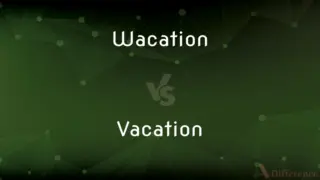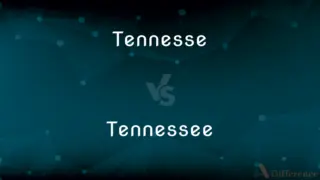Meaned vs. Meant — Which is Correct Spelling?
Edited by Tayyaba Rehman — By Fiza Rafique — Updated on March 24, 2024
"Meaned" is incorrect; the correct past and past participle of "mean" is "Meant," expressing intention or signification in the past.
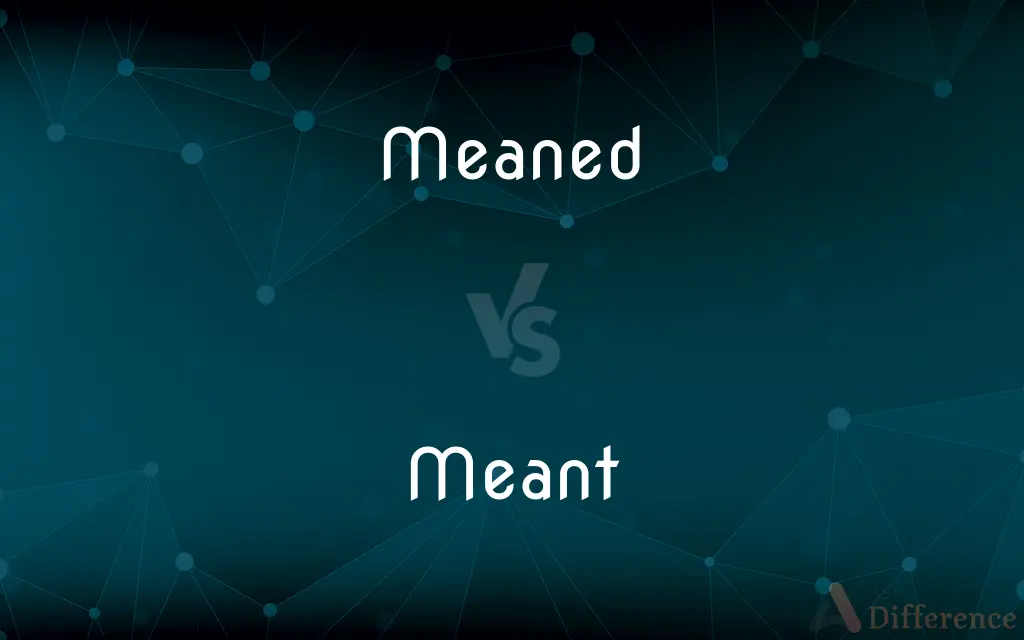
Table of Contents
Which is correct: Meaned or Meant
How to spell Meant?

Meaned
Incorrect Spelling

Meant
Correct Spelling
ADVERTISEMENT
Key Differences
Think of phrases like “I meant to,” focusing on the “t” sound at the end.
To remember "Meant" over "Meaned," recall that "mean" gets "t" for past tenses, similar to "lean" becoming "leant" (in British English).
Also, recognizing that many past tenses are shorter words (e.g., ran, sat), “meant” aligns with this pattern by being shorter than "meaned."
How Do You Spell Meant Correctly?
Incorrect: She said she meaned well when she gave the advice.
Correct: She said she meant well when she gave the advice.
Incorrect: It meaned a lot to her, receiving that award.
Correct: It meant a lot to her, receiving that award.
ADVERTISEMENT
Incorrect: He meaned to arrive early, but got stuck in traffic.
Correct: He meant to arrive early, but got stuck in traffic.
Incorrect: They meaned to finish the project by Friday.
Correct: They meant to finish the project by Friday.
Incorrect: I think you meaned the other folder, not this one.
Correct: I think you meant the other folder, not this one.
Meant Definitions
Expressing what was supposed or intended.
It was meant to be a surprise.
Indicating past intention or design.
She meant to visit earlier.
Used to indicate a particular instance of implying.
Your words meant a lot.
Indicating something intended or arranged.
This gift is meant for you.
Conveying the indicated significance in the past.
Your help meant success.
Past tense and past participle of mean1.
Simple past tense and past participle of mean
Meant Meaning in a Sentence
The symbol meant peace in their culture.
The gift meant more to him than words could express.
I meant to call you, but my day was incredibly busy.
He meant what he said about wanting to help.
They meant to save a seat for you at the event.
She never meant to hurt anyone's feelings.
This place has always meant a lot to me.
This law was meant to protect endangered species.
The teacher's advice was meant to guide us.
The scholarship is meant for students in financial need.
This technique is meant to simplify the process.
That comment wasn't meant to be taken seriously.
The story meant to illustrate the importance of honesty.
The quiet moments together meant the most to them.
This gesture is meant as a sign of respect.
He always meant to learn a musical instrument.
The novel is meant to challenge our thinking.
The movie was meant to start a conversation on the issue.
Her work is meant to inspire young artists.
Meant Idioms & Phrases
No harm meant
Used to assure someone that no offense or damage was intended.
He apologized quickly, saying no harm meant.
Well-meant
Having good intentions, even if the outcomes are not always successful.
Her well-meant advice didn't solve the problem, but I appreciated her effort.
Meant to be
Destined or fated to happen in a certain way.
They felt their meeting was meant to be.
What's meant to be will always find a way
A saying that suggests that destiny will bring about what's supposed to happen.
Don't worry too much about the outcome; what's meant to be will always find a way.
Meant for each other
Perfectly suited for one another.
From the way they look at each other, you can tell they're meant for each other.
Common Curiosities
What is the root word of Meant?
"Mean."
What is the verb form of Meant?
"Meant" is the past simple and past participle form of the verb "mean."
Which conjunction is used with Meant?
"And" (meant and did).
Why is it called Meant?
The term "Meant" originates from the Old English “mǣnan” meaning to signify.
What is the pronunciation of Meant?
/mɛnt/
Which vowel is used before Meant?
Typically, "a" (a meant).
What is the singular form of Meant?
Meant (non-pluralizable).
Which preposition is used with Meant?
"For" (meant for).
Is Meant a vowel or consonant?
It’s a word, which contains both vowels and consonants.
Is the Meant term a metaphor?
No, but it can be used in metaphorical expressions.
Is Meant an abstract noun?
No.
Is Meant a negative or positive word?
Neutral.
Is Meant a collective noun?
No.
Is the word Meant a Gerund?
No.
Is the word “Meant” a Direct object or an Indirect object?
It can be used as either depending on the sentence.
How many syllables are in Meant?
One.
What part of speech is Meant?
Verb.
What is the second form of Meant?
Meant.
What is the third form of Meant?
Meant.
Which article is used with Meant?
"The" (the meant).
Is Meant a noun or adjective?
Neither, "Meant" is a verb.
Is Meant an adverb?
No.
Is Meant a countable noun?
No.
Is the word Meant imperative?
No.
How do we divide Meant into syllables?
Meant is one syllable and cannot be divided.
What is a stressed syllable in Meant?
The whole word "Meant" is stressed.
What is another term for Meant?
Intended.
What is the opposite of Meant?
Did not mean.
What is the first form of Meant?
Mean.
How is Meant used in a sentence?
"I meant to call you yesterday."
Share Your Discovery
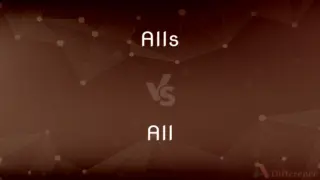
Previous Comparison
Alls vs. All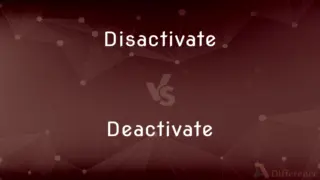
Next Comparison
Disactivate vs. DeactivateAuthor Spotlight
Written by
Fiza RafiqueFiza Rafique is a skilled content writer at AskDifference.com, where she meticulously refines and enhances written pieces. Drawing from her vast editorial expertise, Fiza ensures clarity, accuracy, and precision in every article. Passionate about language, she continually seeks to elevate the quality of content for readers worldwide.
Edited by
Tayyaba RehmanTayyaba Rehman is a distinguished writer, currently serving as a primary contributor to askdifference.com. As a researcher in semantics and etymology, Tayyaba's passion for the complexity of languages and their distinctions has found a perfect home on the platform. Tayyaba delves into the intricacies of language, distinguishing between commonly confused words and phrases, thereby providing clarity for readers worldwide.






























